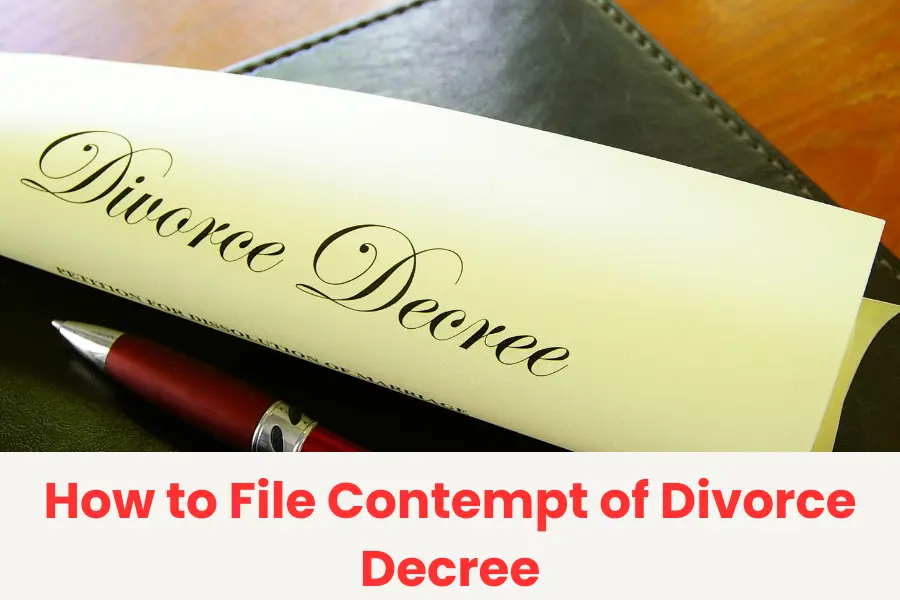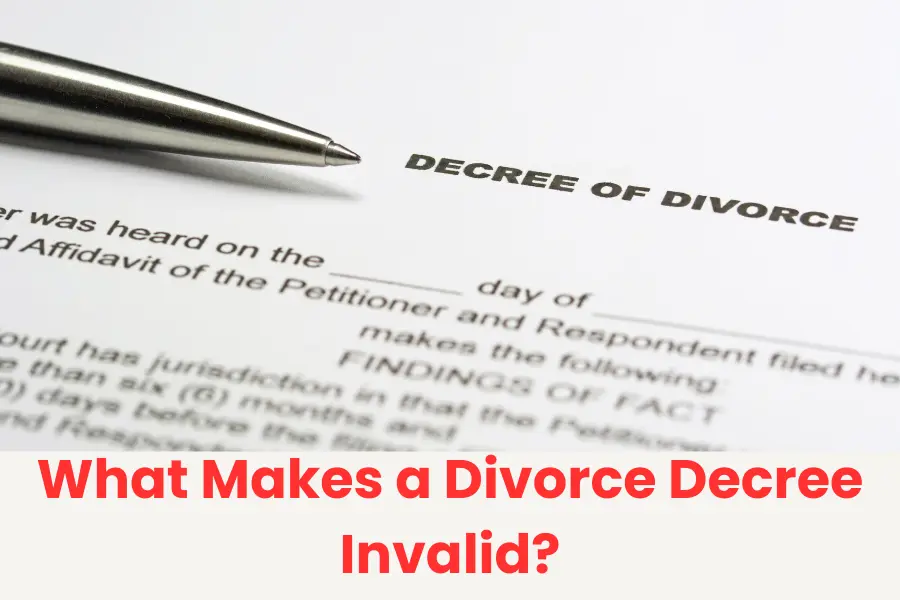What Makes a Divorce Decree Invalid? 10 Things to Know
Mistakes like improper jurisdiction, missing signatures, or even fraud can throw your entire divorce settlement into chaos. If a decree isn’t legally sound, it could lead to more court battles, financial headaches, and frustration for everyone involved.
So, what makes a divorce decree invalid? The good news is, once you know the potential issues—like jurisdiction problems or failure to finalize—you can take steps to fix them. In this blog, I’ll explain all the common reasons a divorce decree can become invalid, how to fix it, and what to watch out for.
Stick with me, and I’ll help you navigate this tricky process with confidence.
Key Points
- A divorce decree can become invalid if the court lacks jurisdiction.
- Failure to notify your spouse properly can lead to challenges.
- Fraud or hidden details can cause legal complications.
- Coercion or duress during the agreement process makes the decree unenforceable.
- Errors in paperwork or skipped procedures can void the decree.
- An invalid marriage leads to an invalid divorce decree.
- Failing to finalize the divorce leaves the decree incomplete.
- Violations of the decree can result in serious legal consequences.
What Makes a Divorce Decree Invalid?

A divorce decree can become invalid for several reasons, like mistakes in the process, missing documents, or even dishonesty. These issues can cause stress and confusion, but understanding them can help you fix things.
Let me break it down:
Improper Jurisdiction
Let’s start with jurisdiction, which is basically about whether the court had the right to handle your divorce. For example, most states require you or your spouse to have lived there for a certain amount of time before filing. If that requirement isn’t met, the court doesn’t have the authority to issue a valid divorce decree.
Why is this such a big deal?
Well, think of it like building a house on land you don’t own. Sure, you can build it, but it won’t legally belong to you. If jurisdiction wasn’t proper, your divorce decree could be challenged later, leaving you stuck in a legal mess.
Double-checking residency requirements before filing can save you a lot of headaches.
Lack of Proper Notification
When you file for divorce, you’re required to let your spouse know officially. This is done by serving them with divorce papers. If this step is skipped or done incorrectly, your spouse has every right to challenge the decree.
Imagine finding out years later that you were divorced without ever being told. Crazy, right? Courts take notification very seriously because everyone deserves the chance to participate. If there’s any doubt about whether this was done properly, it’s worth investigating and fixing.
Fraud or Misrepresentation
This one’s a biggie. If your spouse hid assets, lied about their income, or gave false information during the divorce process, it can mess up the entire decree. A fair divorce settlement depends on both parties being honest.
For instance, let’s say one spouse stashed away a secret bank account and didn’t disclose it. That’s fraud, and it means the court’s decision was based on incomplete or false information.
If you suspect this happened, you can go back to court and ask for the decree to be reviewed and possibly changed.
Coercion or Duress
Divorce agreements need to be made willingly. If one spouse was forced, threatened, or pressured into agreeing to the terms, the decree isn’t valid. This could look like a spouse saying, “Sign this, or I’ll make your life miserable.”
It’s unfair and, more importantly, illegal. Courts take these situations seriously, and if coercion was involved, they’ll often revisit the case to ensure everything is fair and voluntary. Speak up if you feel you were pushed into agreeing to something you didn’t want.
Clerical Errors
Sometimes, it’s not fraud or coercion—it’s just plain human error. Typos, wrong dates, or missing details in your divorce paperwork can make the decree unenforceable.
For example, if your name is spelled wrong or the settlement terms aren’t clearly stated, it can cause legal issues later.
The good news? Clerical errors are usually easy to fix. You can file a request with the court to correct them. It’s always a good idea to carefully review your decree before signing it to catch any mistakes early.
Violation of Legal Procedures
Courts have strict rules about how divorces should be handled. Skipping required steps—like mandatory waiting periods, filing deadlines, or counseling sessions—can invalidate the decree. It’s not just about following the rules for the sake of it; these procedures are designed to ensure fairness.
If something was missed during your divorce, it could come back to haunt you. The best way to avoid this is to work with a lawyer or make sure you understand the process from start to finish.
Invalid Marriage
Here’s a tricky one: if the marriage itself wasn’t legal, the divorce decree can’t be valid either. This could happen if one spouse was already married (bigamy) or if there was no legal documentation for the marriage in the first place.
If the marriage wasn’t valid, the court might declare it void instead of granting a divorce. This is a complex situation, so if you think this applies to you, talk to a legal expert to figure out your next steps.
Failure to Finalize the Divorce
Filing for divorce is just the beginning. To finalize it, both parties need to complete all required steps, like signing the final paperwork. If you don’t, the decree won’t hold up in court.
Think of it like baking a cake but forgetting to take it out of the oven. It’s not done, and you can’t serve it. If you’re unsure whether everything was finalized, check with the court or your attorney to confirm.
Non-Compliance with Court Orders
Divorce decrees often include court orders about things like dividing assets or paying child support. If one party ignores these orders, it can cause major problems. While this doesn’t make the decree invalid, it can lead to enforcement issues or even changes to the decree.
For example, if your ex refuses to sell a shared property or pay spousal support, you can ask the court to step in and enforce the order. Don’t let non-compliance slide—it’s your right to have the terms followed.
Appeal or Reversal
Lastly, if one party appeals the divorce decree and wins, the original decree gets overturned. This can happen if there were errors or unfair rulings during the case. A higher court might step in and issue a new decision.
Appeals are rare but not impossible. If you’re unhappy with your decree and believe the court made a mistake, consider talking to an attorney about your options. It’s a long process, but sometimes it’s worth it to set things right.
How Long Does a Divorce Decree Last?

A divorce decree doesn’t expire. Once it’s issued, it remains in effect indefinitely. This means the orders within it, like spousal support, child custody, or property division, must be followed until they are completed or legally modified. Some parts, like child support, have timelines, but others, like property division, stay permanent.
However, life isn’t static. Situations change, and so can the terms of your divorce decree. If something becomes unmanageable or outdated—like financial obligations or visitation schedules—you can request a modification.
But until a court approves those changes, the original decree stays legally binding. Think of it as a set of rules you agreed to follow unless the court says otherwise.
Consequences of Breaking a Divorce Decree
Ignoring a divorce decree isn’t just unfair—it can lead to legal trouble. Courts take violations seriously, whether it’s skipping child support payments, withholding visitation rights, or failing to divide assets as ordered.
Here are seven potential consequences:
- Fines: The court may impose monetary penalties for non-compliance.
- Wage Garnishment: Payments like child or spousal support can be deducted directly from wages.
- Property Seizure: The court can order the seizure or sale of assets to fulfill the decree.
- License Suspension: Some states suspend driver’s or professional licenses for non-compliance.
- Contempt of Court Charges: This can result in fines, probation, or even jail time.
- Loss of Custody Rights: Violations can lead to changes in custody or visitation arrangements.
- Damage to Reputation: Non-compliance might affect personal and professional relationships.
How to File Contempt of Divorce Decree?

Filing for contempt means asking the court to enforce the terms of your divorce decree because the other party isn’t following them. It’s a formal way to hold them accountable and ensure fairness. Let me guide you through the steps.
Step 1: Understand What Constitutes Contempt
Contempt happens when someone willfully disobeys a court order. This includes skipping child support, refusing visitation, or hiding assets. If the violation wasn’t intentional—for example, if someone lost a job and couldn’t pay support—it might not qualify.
Think of this step as identifying the problem. Gather all evidence, like missed payment records or denied visitation schedules, to show the violation clearly. The court will need proof to act.
Step 2: File a Motion for Contempt
You’ll need to file a motion with the court, explaining the violation and asking for enforcement. Many courts have forms available, but you can also consult a lawyer to make sure it’s done correctly. Be specific about what part of the decree was broken.
Once you file the motion, the court will notify the other party and set a hearing date. This is where you’ll present your evidence and explain the situation.
Step 3: Attend the Court Hearing
During the hearing, you’ll present your case, and the other party will have a chance to respond. The judge will review the evidence and decide whether contempt occurred. If it did, they’ll order consequences, like fines or enforcement actions.
Be honest and clear during the hearing. This is your opportunity to show how the violation has impacted you or your family. Courts take these cases seriously and aim to ensure justice.
How Much Does It Cost to Modify a Divorce Decree?
The cost of modifying a divorce decree varies, but it typically includes court filing fees, attorney fees, and any associated costs like mediation. Filing fees alone can range from $50 to $300, depending on your state.
If you hire a lawyer, expect additional expenses, which could bring the total to $1,000 or more.
However, the cost isn’t just financial—it’s also about time and effort. Modifications usually require filing a formal request, attending hearings, and providing evidence of the changes in your circumstances. For example, if you want to reduce child support payments, you’ll need to show proof of a job loss or medical emergency.
If money is tight, you may qualify for fee waivers or legal aid programs in your area. Courts often understand financial struggles and may accommodate requests for reduced fees. Always check with your local court or attorney to get an accurate estimate of the costs involved in your case.
Once a Divorce Is Final, Can It Be Reopened?
Yes, but reopening a finalized divorce isn’t easy. Courts generally consider divorce decrees as final unless there’s a compelling reason to revisit the case. Common reasons include discovering hidden assets, fraud, or significant changes in circumstances that affect the agreement’s fairness.
For example, if your ex hid a bank account during the divorce, you could ask the court to reopen the case. Similarly, if a custody agreement no longer works because one parent moved far away, you might need to request changes.
Keep in mind, though, that reopening a divorce often requires strong evidence and legal guidance.
Violation of Divorce Decree in Texas
In Texas, violating a divorce decree is a serious matter. Whether it’s missing child support payments, refusing visitation rights, or not dividing property as ordered, the court won’t take it lightly. These violations can lead to legal actions to enforce the decree.
Texas courts can impose various penalties for violations. For example, if someone skips child support, their wages can be garnished, or they could lose their professional licenses.
Similarly, refusing to follow custody orders could result in modified visitation rights or even jail time for contempt of court.
If you’re dealing with a violation, document everything—missed payments, denied visitation, or any other breach. Then, file a motion for enforcement with the court. Texas laws are designed to protect the rights of both parties, so don’t hesitate to act if your ex isn’t following the decree.
Can a Divorce Decree Be Voided?
Yes, but only in rare cases. A divorce decree can be voided if there was a fundamental issue with the original case, such as fraud, coercion, or the court lacking proper jurisdiction. Essentially, the decree becomes invalid because it wasn’t legally sound to begin with.
For example, if you find out your ex lied about their income or hid assets during the divorce, you might be able to challenge the decree. Similarly, if the court didn’t have jurisdiction—like if neither spouse met residency requirements—the decree could be voided.
Conclusion
Understanding what makes a divorce decree invalid can save you from unnecessary stress. Here are key takeaways:
- Double-check that your court has proper jurisdiction before filing.
- Always ensure proper notification of all involved parties.
- Be honest and transparent to avoid fraud-related challenges.
- Keep an eye on legal procedures and finalize all documents.
- If something feels off, don’t hesitate to seek legal help.
Knowing what to look out for helps you stay ahead of problems and ensures your divorce decree remains valid.






